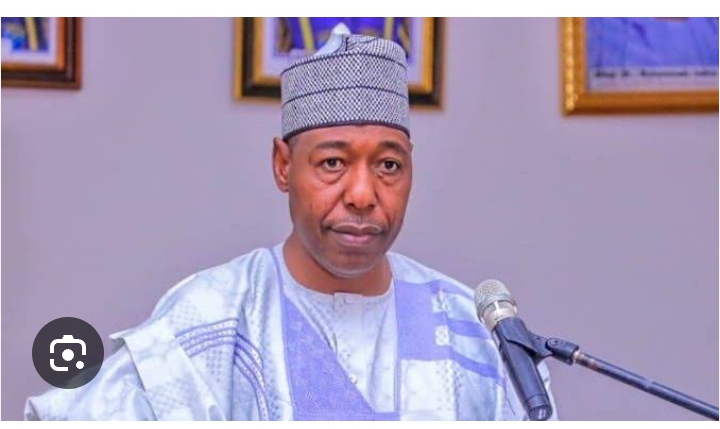Governor Babagana Umara Zulum of Borno State has once again raised concerns over the resurgence and regrouping of Boko Haram and Islamic State West Africa Province (ISWAP) terrorists within the Lake Chad region and parts of Sambisa Forest, particularly around the Mandara Hills. The governor voiced his concerns in Maiduguri during a high-level visit by the Minister of Defence, Mohammed Badaru Abubakar, alongside the Chief of Defence Staff, General Christopher Musa, and other senior military officials.
Zulum, while commending the Nigerian military for the significant progress made in combatting insurgency in Borno and the wider North-East region, did not shy away from highlighting what he described as a troubling trend—terrorists reclaiming territories previously liberated by security forces. According to him, the inability to sustain operations in reclaimed areas has allowed Boko Haram and ISWAP fighters to return, regroup, and entrench themselves once more, particularly in the Tumbus axis of Lake Chad, which remains largely ungoverned and difficult for military forces to access.
He noted that since the onset of the insurgency, there has never been a full-scale military operation along the shores of the Tumbus in Lake Chad, an area he described as a “breeding ground” for terrorists. The governor stressed that the terrorists not only find refuge in these waterlogged terrains but also sustain themselves economically from activities in the area, further strengthening their hold on the region.
“What we are witnessing is a cycle,” Zulum remarked. “The military launches operations and reclaims territories, but as soon as the troops withdraw, the insurgents return. There is an urgent need to adopt continuous, sustained operations—especially within the Tumbus and Mandara Hills—if we are to break this pattern.”
The governor also drew attention to the broader regional implications of the insurgency, warning that the porous borders between Nigeria and Sahelian countries continue to facilitate the infiltration of foreign fighters and illegal arms into Nigeria. He reiterated that without securing the Sahel region, Nigeria’s internal security would remain compromised. Zulum urged the federal authorities to prioritize the reinforcement of military presence across critical zones, especially within what he termed the “Timbuktu triangle,” an expansive and rugged terrain notorious for harboring insurgents.
Acknowledging the immense strain on military resources across the country due to multiple security challenges in various geopolitical zones, Zulum nonetheless appealed for the deployment of more trained military personnel to the North-East. He pointed out the operational differences between insurgents like Boko Haram and ISWAP and criminal bandits, noting that the former groups enjoy foreign support, making them more dangerous and better equipped.
Governor Zulum made a strong case for advanced military hardware and tactical support, calling for the deployment of tracked armored tanks, Mine-Resistant Ambush Protected (MRAP) vehicles, and air support to strengthen ongoing efforts. He cited a recent ISWAP-led attack in Wulgo, near the Cameroonian border, reportedly executed using armed drones, as evidence of the growing sophistication of these terror groups. According to him, the use of such advanced weaponry by terrorists underscores the need for the Nigerian military to urgently invest in modern technology, including attack drones and anti-drone systems.
He also emphasized the importance of combining kinetic operations with non-kinetic strategies, particularly through rehabilitation and reintegration efforts. In his words, “Over 300,000 former Boko Haram members have surrendered in the last three years. Not all of them are fighters—many were coerced or are simply civilians who need to be reintegrated as farmers or artisans. We must not ignore the non-military solutions.”
Governor Zulum expressed confidence that with the right support and strategy, the security situation in Borno would improve. He assured the federal government and military leadership of his administration’s full cooperation in the ongoing efforts to end the insurgency that has plagued the region for over a decade.
Responding to the governor’s concerns, Defence Minister Badaru Abubakar reaffirmed the federal government’s commitment to addressing the security challenges in the region. He promised that more military support and resources would be made available to ensure a decisive end to the insurgency across Borno and the entire North-East.
The renewed concerns from Borno’s frontline leader come at a time when regional and international observers continue to monitor developments in the Lake Chad Basin—a region long destabilized by the activities of terrorist groups and facing growing humanitarian and security crises.
